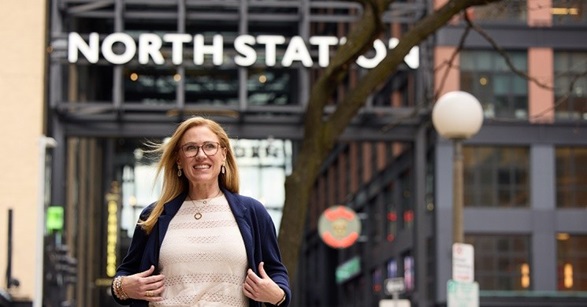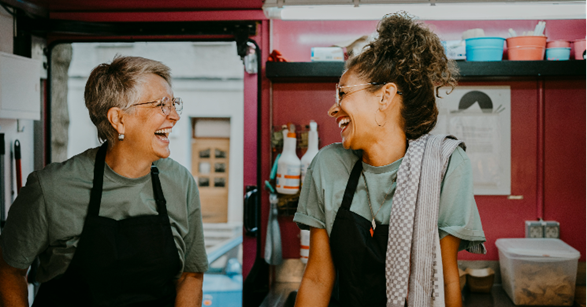What do a groundbreaking choreographer, a leader in the dynamic field of venture capital, and an award-winning author, producer and television writer have in common? They’re all female entrepreneurs who have achieved considerable success in their respective fields — and on their own terms.
From New York City to San Francisco, these women are putting their organizations on strong financial footing, navigating family life and motherhood, and paving a path forward for future generations of women and girls.
Born in Salt Lake City, Utah, Andrea Miller knew as a young girl that she was more interested in choreographing her own dances than in performing on stage. Today, the Juilliard graduate is the Founder and Artistic Director of Brooklyn-based dance company Gallim. She’s also a Guggenheim Fellow and the first choreographer to be named an artist-in-residence at the Metropolitan Museum of Art.
While many choreographers begin their work after completing full careers as dancers, Miller took a different path, founding Gallim in 2007 at the age of 26.
“I wanted to build a home for my creative vision, a venue to explore what’s possible not only for a dance company, but for artists with a shared thirst for exchange and collaboration, and a desire to be relevant,” she explained.
Over the past decade, Gallim has explored the human experience through dance at renowned venues worldwide, including the Joyce, the Brooklyn Academy of Music, Lincoln Center, the Kennedy Center and the Théâtre National de Chaillot.
Sonja Hoel Perkins traces her entrepreneurial roots back to her days at the University of Virginia, where her father was a professor of engineering. To earn money for a homecoming dress and other living expenses, Perkins took on a variety of jobs in the university computer labs because they paid the highest wages. The tech-savvy undergrad did everything from teaching Lotus to business professionals to troubleshooting problems and writing a census program for the university hospital.
Perkins’ tech experience was a harbinger of achievements to come. Today, she’s a San Francisco–based investor, advisor and philanthropist whose roles include Managing Director of The Perkins Fund, Founder of the all-female Broadway Angels venture capital group and Founder of Project Glimmer, a nonprofit that inspires at-risk teenage girls and women to believe in themselves.
Throughout her career, obstacles have only reinforced Perkins’ commitment to meeting her objectives: “The thing that helped me progress my career was not getting financial help,” she revealed. “I was highly motivated.”
Susan Fales-Hill is an award-winning storyteller who has spent her career exploring Americans’ common humanity. A television writer, producer, screenwriter and author, she grew up in New York City going to the theater with her mother, the late Haitian-American actress, singer and dancer Josephine Premice.
Although she inherited her mother’s flair for drama, Fales-Hill ultimately decided to create stories rather than perform them. In addition to building a 30-year career as a television writer and producer (the groundbreaking 1980s sitcom “A Different World” is one of her credits), Fales-Hill has published three books, including a critically acclaimed memoir about her mother, Always Wear Joy.
“Once I started doing it, I knew that my life was telling stories — and particularly telling stories about people who were not front and center,” she said.
These women have helped change the narrative of how to succeed in traditionally male-dominated industries. They’ve relied on good advice, discipline, careful planning and their unique visions to successfully grow their ventures, while remaining true to their ideals.
Choreographing Success
As Miller pointed out, there are remarkably few female choreographers receiving major support and visibility.
“Most choreographers who are appointed to leadership positions are men, in a community where the majority of the participants are women,” she said.
“It’s a tremendous uphill effort,” she said, and righting the balance might necessitate “a cultural revolution.”
Miller is pushing the boundaries in dance to reach a wider audience — not only in terms of gender roles, but by collaborating with representatives of the art, film, theater, tech and fashion worlds to create multidisciplinary work that expands dance beyond its traditional theater venues and into public spaces.
“I’m concerned about the future of dance if it’s going to be confined to theaters,” Miller said.
“To survive and stay culturally relevant,” she said, “it has to dive into the wider stream of humanity.” Dance, she’s convinced, needs to go “beyond art” and take up the question of “existential meaning,” not to mention social, environmental and economic issues.
Miller’s first work for the Met, Stone Skipping, saw its debut performance in the museum’s dramatic Temple of Dendur exhibition space, and offered a perspective on environmental degradation.
Like many entrepreneurs, Miller had to learn through experience — in her case, via her residency at the Met — how to adapt her vision to a new market. She realized it’s important to know when to push back on changes that compromise your vision and when to accommodate revisions.
“It’s a practice of continually going back to your vision and your idea, and understanding what’s essential to it,” she said.
Miller said the problem-solving skills she developed in adapting her dances for a museum space instead of a traditional stage have enhanced her choreographic skills.
“Having limitations is actually inspiring,” she said. “When I went into the residency, my goal was for it to be transformative and I feel like that’s exactly what happened.”
Beyond fulfilling her artistic vision, Miller also learned how to run her dance company like a business. “I trained to be a professional dancer. It wasn’t really to be an entrepreneur,” she said.
Miller’s mother, a radiologist and what Miller calls “a woman of unbreakable spirit and obsession with detail,” supported Gallim’s development on the administrative side.
Miller also receives business advice from Jim Herbert, Chairman, Chief Executive Officer (Founder) and Board Member of First Republic Bank.
“He was the first person to tell me: ‘You’re an entrepreneur,’” Miller said. “For every milestone and every major challenge that I’ve had along the way, I’ve consulted him, and he’s given me time.”
In addition, First Republic found opportunities for bank employees to attend Gallim’s events and performances when they were in New York or elsewhere where the troupe was performing.
“They found ways of connecting our art with their business community,” Miller said.
The business lessons she’s learned, meanwhile, have improved her creative process. “You multiply your ability to understand, problem solve and create when you have more lessons from places that are outside your field,” she said.
Miller has also learned to balance her work with motherhood. Doing so was especially difficult given the lack of working-mother role models in her dance-world milieu.
“Almost nobody I worked with had kids,” she said. “I thought I had to choose between dancing and having a family.”
Miller has changed the conversation by making motherhood visible: leading rehearsals well into her pregnancies, breastfeeding in the studio and bringing her two children (now ages three and five) to see performances.
She encourages women to acknowledge the challenges and obstacles in their paths — and then move past them.
“You just can’t let it stop you,” she said. “You have to believe in what you’re pursuing and push ahead.”
Investing In Women
When her father turned 80, Perkins wrote him a letter thanking him for everything that he didn’t give her. After all, the computing jobs Perkins took to pay for her college expenses represented the first steps on the road to a prosperous career investing in — and thus making the difference for — visionary startups.
Perkins has now invested in over 50 companies in all areas of information technology including success stories like F5 Networks, McAfee Associates and Q1 Labs. Many of her investments have achieved multibillion-dollar market valuations.
After graduating from college in 1988, Perkins helped the London Stock Exchange transition from a paper to electronic-based trading system. She landed her first job in venture capital in 1989 as an investment analyst for Boston-based TA Associates, which had recently discovered the software industry as an investment category.
“I was like the first summer intern at Facebook,” she said. “Everybody wanted to hire that person because they understood social media, and a lot of venture capitalists were interested in hiring me because I had PC experience.”
While only 7% of VCs are women, Perkins wasn’t aware of any conscious gender bias as her career took off. But with only 2% of VC dollars going to women, she says it’s clear that some form of gender bias exists. And that bias can impact both workplaces and which investments VCs choose.
Perkins founded Broadway Angels in 2010 as an all-female investment group. Although it wasn’t her original intent, the organization served as a catalyst for raising awareness about gender inequity among VCs and their investments.
Broadway Angels invests in both male and female entrepreneurs without using any gender criteria. “We don’t do anything extra because women don’t need any extra help,” Perkins said. “They just need to be considered.”
Proving Perkins’ point, women have founded about 50% of the companies that Broadway Angels and the Perkins Fund, which she launched in 2016, invest in. “It turns out that men and women are about equally good at being entrepreneurs,” she said. “If you don’t have unconscious bias, more women will get funded.”
Perkins added, however, that women entrepreneurs struggle to grow their companies once they’re funded because women typically raise less money than men. “I’ve seen that happen time and time again,” Perkins admitted. “That’s why I always encourage women founders to raise more money.”
As an entrepreneur herself, Perkins gets an assist from First Republic, from security threat assessments to notary public services. She said that the Bank distinguishes itself from other financial organizations by asking how it can help you with your business.
“They’re more than a bank,” she said. “First Republic focuses on how to help you achieve your goals.”
She wants others to be able to achieve their goals, too. Project Glimmer — which Perkins founded in 2010 — works to inspire under-resourced teenage girls and women. “We hope that when these girls believe in themselves that they’ll go for the hard jobs, they’ll take the hard classes, and they’ll take a harder way because they know that they can do it,” she said.
Perkins achieves balance with her own children by focusing on quality time over quantity. School and work are priorities, she said, but time off is sacrosanct. “When I’m with my family, I’m with my family,” she said.
Perkins advises working parents to be kind to themselves: “You don’t have to get it perfect. You don’t have to get it right all the time. You just have to have your heart in the right place.”
Telling The American Story
A Harvard graduate, storyteller Fales-Hill launched her TV career as a writer for The Cosby Show and its spin-off A Different World. The latter, in addition to entertaining audiences, tackled crucial cultural issues such as date rape, racism and domestic violence. An AIDS-themed episode that she wrote for A Different World nearly lost the show its network backing, but ended up winning awards and plaudits.
She said that after it ran, some 50 clinics wrote letters to the show crediting the episode for the fact that hundreds of people were coming in to be tested for HIV.
“I was very blessed to be on these shows that were at the cutting edge,” she said.
Fales-Hill stressed the collaborative nature of TV writing: It’s an ongoing process of negotiation between different personalities. “To find each other’s humanity and find a way to get to the same work conclusion — it really set the tone for the rest of my life,” she said.
The uncertainty of TV work also taught Fales-Hill important lessons about managing wealth. “The gravy train does, at some point, pull into the station, so be cautious with your money,” she warned. “Your talent doesn’t necessarily determine how successful you’re going to be.”
Fales-Hill said First Republic has helped her grow by respecting her — and her small business of one. “They really are so service-oriented and they never make you feel small,” she said. “They help you plan for the future and [show] how you can scale.”
As the golden age of sitcoms evolved into the world of reality TV, Fales-Hill transitioned from television writing to authoring magazine articles and books. She wrote an article for Vogue in 2000 about growing up biracial that universities have used as a teaching resource, and she published Always Wear Joy, her first book, in 2003.
Fales-Hill’s mother passed away when she was writing that memoir. “It was painful but it was actually the best way to mourn someone,” she said. “It was very cathartic.”
After her mother passed away, it became even more important to do work that she felt mattered. “There are so many wonderful stories that haven’t been told about people of color and their interconnectedness with people from the majority here in our country,” she explained.
Telling those stories has sometimes produced unexpected results. Fales-Hill recently wrote a magazine piece about her unpleasant discoveries regarding her own family’s participation in the slave trade, which she is now researching for a new book.
“I have to say that it has been really painful,” she said. Yet Fales-Hill is committed to exploring the history of both her black ancestors and her white ones from her father’s side.
“I realized, these are your forebears,” she said. “This is what you come from. This is part of why you stand where you do on the gameboard of life in America. I refuse to sweep any of it under the rug.”
The point of her research is to make progress towards identifying what we all share as people.
“If we don’t understand why we ended up where we all are, we’re never going to be able to move forward,” she said. “It’s not just my story — it’s the American story.”
A Better World
All three women say they’re proud to help change the rules of the game for female entrepreneurs in their respective fields.
“I feel really proud about the relationships that I’ve built on this journey, and how all of them impacted the creative work that I do,” said Miller. “I’ve been challenged to figure out so many things that I didn’t know how to do, and that pushed my work and relationships to the edges.”
Fales-Hill said one of her proudest moments was receiving a letter from a woman in her 80s who wrote that her memoir made her realize that all races are equal.
“I’m proud of the work I’ve been able to do that has reminded people of our common humanity,” Fales-Hill said. “Those are the moments where you say, ‘Maybe I left the world slightly better than it was when I arrived.’”
Perkins said she takes pride in both her family and the visionary businesspeople in whom she invests. “I’m very, very proud of my entrepreneurs who literally are changing the world,” she said.
“I just think that the number one secret sauce that all women have is just believing in themselves,” Perkins added. “If a woman believes in herself, she can change the world, period.”




